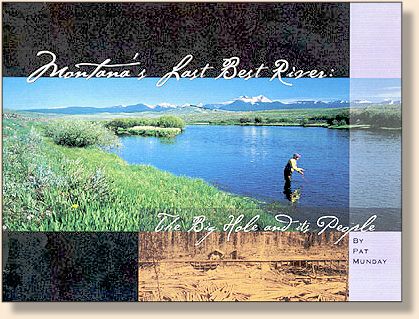Reviewed by Paul Vang, Butte, Montana
It should come as no surprise that the Big Hole is close to my heart. I had my
first look at the Big Hole back in 1986. We were still living in eastern North
Dakota at the time, and decided, for our next vacation, to take a look at more
of Montana.
We spent a few days on the Missouri River, then we went over Rogers Pass
and down the Blackfoot River, up the Seeley-Swan, and then to the Glacier
National Park area. Above Hungry Horse Reservoir we camped in frigid rain
and attempted to see the Park, which, that day, was socked in with heavy snow
and pea soup fog. We fled to the upper Bitterroot, and then came over Lost
Trail Pass.
We visited the Big Hole Battlefield, drove through Wisdom and Wise River, and
finally took the Interstate into Butte. From this first look at this
corner of southwestern Montana, I decided that, "We could live here."
When the right job opening came
up a year later, I didn't hesitate.
Since then, I have spent a lot of time roaming the Big Hole area, from headwaters
creeks to the cottonwoods of the lower river. I've fished the waters, hunted for
deer and waterfowl in the bottomlands, and grouse in the uplands. I've caught fish.
I've been skunked a few times. Heaven knows we've swatted mosquitoes. I've
had a couple face-offs with lower river rattlesnakes, and had anxious moments
after one of them bit our son. I could keep going on in this vein. Let's just say
that if someone were to ask if I have a "home water," I'd say, without hesitation,
"It's the Big Hole."

These last few weeks, I've had the rare opportunity to get a sneak preview of a book
that is still a couple months from publication. Montana's Last Best River: The Big
Hole and its People is a first book by Montana Tech professor Pat Munday.
Though Lyons Press is publishing it, it's a production of the Big Hole River Foundation,
and all proceeds from the sale of the book will go to the Foundation.
What kind of book is it?
First of all, it's a large format book, what we usually refer to as a 'coffee table book.' Though
I haven't seen the finished product, it's going to be a book that will fill your lap as you browse
through it, admiring spectacular photography of the Big Hole area, as well as historical
photographs from the early days of the homesteaders and early ranchers.
Books should have more than pretty pictures. This book is much more than that. It's an
intimate look at the geography of the Big Hole area. It's a history of the Native Americans
who lived and traveled through the area, long before Lewis & Clark and the Corps of
Discovery explored the headwaters of the Missouri River system.
The 19th and 20th Centuries brought change to the Big Hole. After the Lewis & Clark
expedition came the trappers and mountain men, the miners, the heartbreak of the Nez Perce
struggle, and, finally, homesteaders and the development of ranching and a agricultural
economy in tune with the land.
Finally, the book addresses the Big Hole as a fishing and recreational resource. From
the early days when fish were trapped to feed hungry miners in Butte, to the days of fish
hatcheries on the river's banks. Finally, it takes a look at today's river as a unique and
nationally important treasure, one of the few rivers left that is free-flowing throughout
its course.
Above all, the book is full of the stories of remarkable people. Pioneers, miners, ranchers,
and conservationists. It includes early educators, such as the late Margaret Hagenbarth,
who taught school in Jackson in the 1930s, and went on to serve as Beaverhead County's
Superintendent of Schools in the 1940s.
Another remarkable person's story is that of George Grant, who, over his long and productive
life, has made immeasurable contributions to the development of a conservation ethic in
modern fishing. He has been a creative fly designer, author, and businessman. Finally,
when many people of his advanced age are willing to be spectators, he had the foresight
to create the Big Hole River Foundation, and to try to be an agent for preserving the
best of the Big Hole heritage.
Pat Munday's book is an important contribution towards creating an understanding of our
part of Montana and the living treasure that is the Big Hole.
Trust me. If the Big Hole is important to you, you'll want this book. ~ Paul Vang
Montana's Last Best River: The Big Hole and Its People
160 pages, Full-color photographs
12" x 9"
Hardcover, $40.00 U.S
ISBN 1-58574-331-3
Published by The Lyons Press.
May be ordered directly from the Big Hole River Foundation, (https://www.BHRF.org)
special editions available.
Previous Reviews
|



